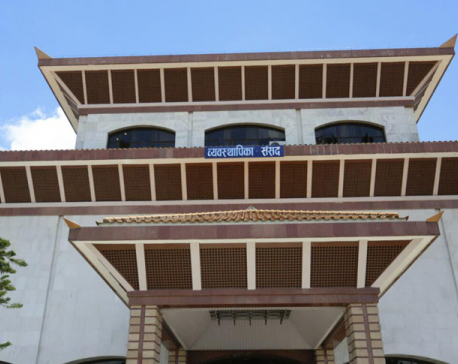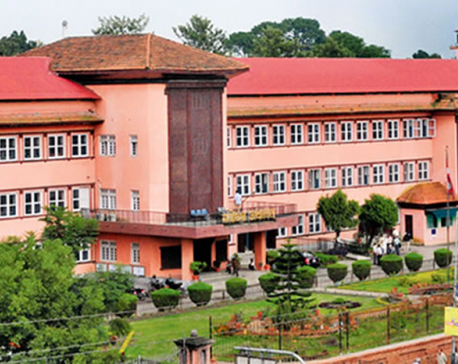
OR
Grave concerns over ‘bloc hearing’
Published On: November 13, 2017 07:00 AM NPT By: Ananta Raj Luitel
KATHMANDU, Nov 13: A total of 71 cases were assigned to a division bench of Chief Justice Gopal Parajuli and Justice Ishwar Khatiwada on October 25.
Of the total cases forwarded to the bench, hearings were held on a third of the cases while the bench did not have time to begin hearings on the next two thirds cases. The remaining cases were postponed by the lawyers concerned.
Similarly, a dozen cases were assigned to a division bench of justices Om Prakash Mishra and Anil Kumar Sinha of the Supreme Court (SC) on November 1. Hearings were held on most of these cases and orders were also issued.
These are just a few examples. Following the introduction of ‘bloc hearing’ in the Supreme Court Rules-2017, there is a common practice of scheduling a huge number of cases of similar nature for group hearings and having them decided by the same bench.
For the past few months, the apex court has been experimenting with the idea of ‘bloc hearing’ of the cases of similar nature. The SC has been making final preparations to officially launch this system of ‘bloc hearing’ on January 15, 2018.
“This system may help decide many cases at the same time but there is a need to seriously consider whether this system can help in imparting justice,” senior advocate Yadunath Khanal told Republica. According to him, there is a high possibility of causing injustice while deciding cases of similar nature at the same time.
“Two or many cases may look similar when viewed from the surface but each case has its own merits and demerits,” Khanal said, adding, “A serious injustice could be caused if cases are decided without seriously considering their technical and factual aspects.”
According to him, the SC administration has been making errors while scheduling cases without scrutinizing the facts of those cases and that may cause injustice to the parties concerned. “Deciding cases in haste may cause injustice.”
In order to discuss the issue of ‘bloc hearing’ of cases, the SC has invited senior advocates for Monday. The Supreme Court Rules 2017 promulgated recently to replace the Supreme Court Rules 1992 has given the power to the chief justice to set up judges’ panels and select cases for hearings.
Rule 31 of the apex court rules mentions the provision of ‘bloc hearing’ of cases of similar nature by setting up panels of judges. The chief justice has the discretionary power to give more cases to such panels of judges, remove judges from the panels or remove cases from the panels of judges as well.
“Even though this may expedite the hearing process, there is a need to weigh whether this process will help in imparting justice,” senior advocate Balkrishna Neupane said. “This may help in disposing cases quickly but this may not help in imparting justice if the court tries to decide cases in a rush.” Stating that the apex court is the last resort for the public, Neupane urged the apex court to decide the cases seriously.
Currently there are 22,000 cases pending at the SC. Even after the promulgation of the Constitution of Nepal, 2015, the case disposal rate has not improved. There are total 21 justices at the SC including the Chief Justice.
Saying that ‘bloc hearing’ may change the perception that the judiciary is slow in deciding cases, senior advocate Chandeshwar Shrestha urged the apex court to improve the managerial parts while selecting cases for ‘bloc hearing’.
“This system has been introduced in order to tackle the workload at the Supreme Court,” Shrestha said, adding, “However, there is need for a rethink in order to impart justice effectively.”
SC Spokesperson Narayan Prasad Panthee, however, said that the system of ‘bloc hearing’ is currently in the phase of experiment and it would be launched formally on January 15, 2018. “The cases will be heard regularly after we adopt this system formally. We expect that the minor errors will be resolved as we get used to this system.”
You May Like This

Special Hour- lawmakers raise concerns on contemporary issues
KATHMANDU, July 24: Lawmakers, speaking during zero and special hour of the Legislature-Parliament on Monday, drew the government's attention towards... Read More...

Hearing on Bharatpur case postponed again
KATHMANDU, July 10: Today's hearing on Bharatpur vote counting dispute was postponed until July 17, citing a lack of time. Read More...








Just In
- Customs revenue collection surpasses target at Tatopani border, Falls behind at Rasuwagadhi border in Q3
- Rain shocks: On the monsoon in 2024
- Govt receives 1,658 proposals for startup loans; Minimum of 50 points required for eligibility
- Unified Socialist leader Sodari appointed Sudurpaschim CM
- One Nepali dies in UAE flood
- Madhesh Province CM Yadav expands cabinet
- 12-hour OPD service at Damauli Hospital from Thursday
- Lawmaker Dr Sharma provides Rs 2 million to children's hospital











Leave A Comment